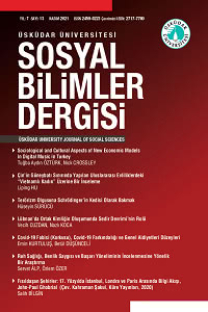Dış Politika Yapımında Liderler ve Yerel Etkenler: Nasır ve Mursi Örnekleri
Liderlerin Mısır'ın dış politikasının oluşturulmasında kilit oyuncular olduğu genel bir varsayımdır. Bu makale bu varsayımı detaylandırmaya çalışmakta ve 1952 ve 2011 devrimlerinden sonra dış politikaların bireysel olarak formüle edilmesi ve uygulanmasının yerel düzeydeki açıklamaların yokluğunda açıklığa kavuşturulamayacağını göstermektedir. Makalede, çeşitli yerel faktörlerin Nasır'ın Mısır'ın dış politikası üzerindeki etkinliğini artırmasına zemin hazırlarken, Mursi'nin kısa görev süresinde istenmeyen bir adam olarak ilan edildiği ve dış politika üzerinde daha az etkiye sahip olabildiği bir ortam oluşturduklarının tespiti yapıldı.
Anahtar Kelimeler:
Mısır, Nasır, Mursi, Dış Politika, Yerel Analiz Seviyesi
Domestic Factors and Leaders in Foreign Policy Making: The Cases of Nasser and Morsi
It has been a general assumption that leaders have been key players in the making of Egypt’s foreign policy. This article tries to detail this assumption and illustrates that individual formulation and implementation of foreign policies following the revolutions of 1952 and 2011 cannot be sufficiently clarified in the absence of domestic level explanations. What is found in this study is that various domestic factors paved the way for Nasser to increase his effectiveness on Egypt’s foreign policy, whereas they created a different environment for Morsi in which he was declared an unwanted man during his short tenure and had lesser influence on foreign policy.
Keywords:
Egypt, Nasser, Morsi, Foreign Policy, Domestic Level of Analysis,
___
- Aboulenein, Ahmed. “Morsy Assumes Power: Sacks Tantawi and Anan, Reverses Constitutional Decree and Reshuffles SCAF.” Daily News Egypt, August 12, 2012. https://dailynewsegypt.com/2012/08/12/morsy-assumes-power-sacks-tantawi-and-anan-reverses-constitutional-decree-and-reshuffles-scaf/.
- Abul-Magd, Zeinab. “The Egyptian Republic of Retired Generals.” Foreign Policy, May 8, 2012. http://foreignpolicy.com/2012/05/08/the-egyptian-republic-of-retired-generals/.
- “Ahmadinejad’s Historic Egypt Visit Prompts Salafist Concerns.” English Al-Ahram, February 5, 2013. http://english.ahram.org.eg/NewsContent/1/0/64084/Egypt/0/Ahmadinejads-historic-Egypt-visit-prompts-Salafist.aspx.
- “Al-Azhar Imam Tells Ahmadinejad Not to Interfere in Gulf.” English Al-Ahram, February 5, 2013. http://english.ahram.org.eg/NewsContent/2/8/64128/World/Region/AlAzhar-Imam-tells-Ahmadinejad-not-to-interfere-in.aspx.
- Allison, Graham T., and Philip Zelikow. Essence of Decision: Explaining the Cuban Missile Crisis. 2nd ed. New York: Longman, 1999.
- Alsharif, Asma, and Yasmine Saleh. “Special Report: The Real Force behind Egypt’s ‘Revolution of the State.’” Reuters, October 10, 2013. https://www.reuters.com/article/us-egypt-interior-specialreport/special-report-the-real-force-behind-egypts-revolution-of-the-state-idUSBRE99908D20131010.
- Ansari, Hamied. Egypt: The Stalled Society. Albany: State University of New York Press, 1986.
- Be’eri, Eliezer. Army Officers in Arab Politics and Society. Jerusalem: Israel Universities Press, 1969.
- Beasley, Ryan K., Juliet Kaarbo, Lantis Jeffrey S., and Michael T. Snarr, eds. Foreign Policy in Comparative Perspective: Domestic and International Influences on State Behavior. California: CQ Press, 2013.
- Beattie, Kirk J. Egypt During The Nasser Years: Ideology, Politics, And Civil Society. Boulder: Westview Press, 1994.
- ISSN: 2459-0223
- Yayın Aralığı: Yılda 2 Sayı
- Başlangıç: 2015
- Yayıncı: Üsküdar Üniversitesi
Sayıdaki Diğer Makaleler
The Discourse of Brotherhood in Turkish Foreign Policy during the AK Party Era
Yükseköğretimdeki Suriyeli Sığınmacı Öğrenciler: Uyum ve Çatışma Alanları
Günahlarımız İçin Başkalarını Suçlamanın Dayanılmaz Hafifliği (Günah Keçisi)
Belçikalı Türk Göçmenlerde Kültürleşme Stratejileri ve Ebeveynlik Tutumu
Birgül KAPAKLIKAYA ERYÖRÜK, Asil Ali ÖZDOĞRU
Büyük Dönüşüm: Çağımızın Siyasal ve Ekonomik Kökenleri, Karl Polanyi, 1944 (Çev. Ayşe Buğra, 2020)
İzmir’de İkame Bir Türkçe Mizah Dergisi: İlâve-i İntibah (1875)
Dış Politika Yapımında Liderler ve Yerel Etkenler: Nasır ve Mursi Örnekleri
